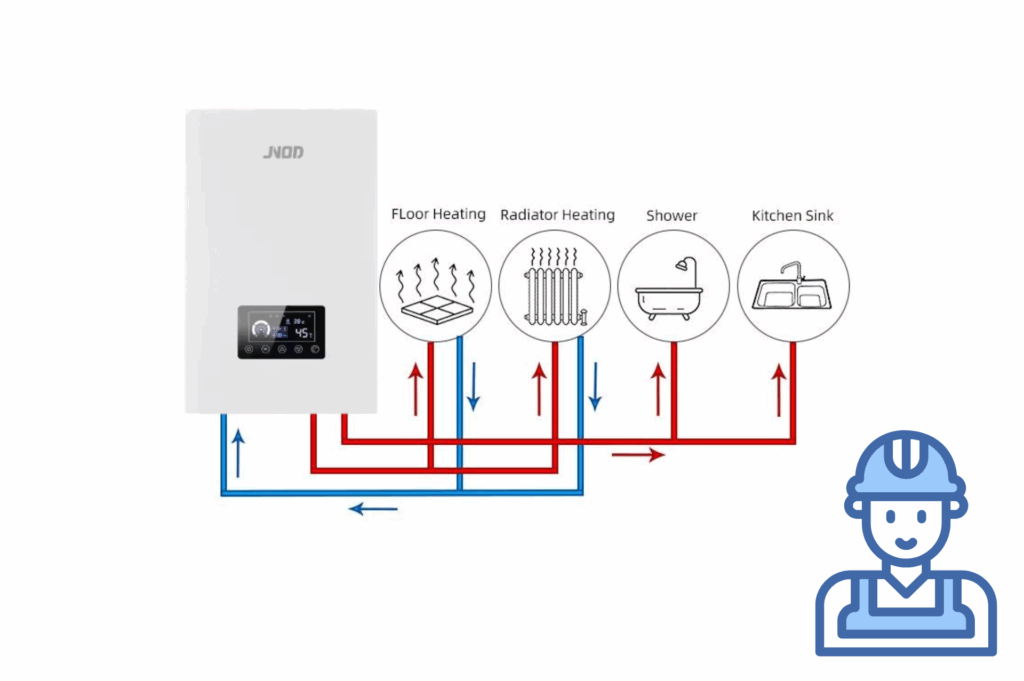Simplifying Installation: Why Contractors Prefer Electric Boilers For Hydronic Heating
As building regulations continue to evolve and decarbonization accelerates, electric boilers for hydronic heating are becoming increasingly popular across Europe, the UK, and North America. For contractors, these systems not only meet sustainable building requirements but also simplify installation, reduce risk, and provide reliable heating performance for their customers.
What Are Electric Boilers for Hydronic Heating?
An electric boiler is a compact heating system that uses electrical resistance to heat water, which is then circulated through radiators, floor heating, or fan coil units. Unlike gas or oil-fired boilers, electric boilers do not rely on combustion, fuel storage, or a flue system.
For contractors, this translates to:
- Faster installation times
- Lower safety risks
- Easier compliance with local regulations on emissions and efficiency
Why Contractors Prefer Electric Boilers for Hydronic Heating
Simplified Installation Process
With no need for flue systems, gas pipework, or ventilation requirements, electric boilers can be installed in as little as half a day. Contractors benefit from reduced labour hours, faster project turnaround, and fewer complications during commissioning. Contractors can improve installation efficiency, thereby increasing profits.
Elimination of Gas Infrastructure
Before installing a gas boiler, an extensive safety check, chimney wiring, and plumbing are required. Not all buildings and apartments are suitable for gas boilers. Electric boilers, by contrast, need only a simple connection to a water and power supply, with simple plumbing hookups and plug-in operation. This makes them especially attractive for the following applications:
- City apartments where space is tight
- Renovation in older buildings, where gas installation is more expensive
- Commercial projects seeking a low-emission heating solution
Compact and Multifunctional Design
Modern wall-mounted electric boilers are slim, lightweight, and flexible to install. They can be placed in kitchens, utility cupboards, or small equipment rooms, freeing up valuable floor area in both residential and commercial spaces.
Electric boilers not only provide heating but can also connect to your water tank to provide hot water. This means you only need one unit for both heating and hot water. Some innovative electric boiler models even have built-in water tanks. Our BP-E model does this, with a built-in 70L water tank, which is sufficient for most family water needs.
Enhanced Safety and Compliance
With no combustion process, there are no risks of carbon monoxide, gas leaks, or flue blockages. For contractors, this means fewer safety concerns, quicker approvals from local inspectors, and compliance with increasingly strict emission regulations.
System Integration Flexibility
Contractors appreciate that electric boilers for hydronic heating integrate seamlessly with:
- Hydronic radiators
- Underfloor heating loops
- Hybrid systems with heat pumps
This flexibility allows them to tailor solutions to diverse building types, from single-family homes or apartments to large multi-unit development projects.

Customer Benefits Align with Contractor Needs
Clients benefit just as much as contractors:
- 98%+ operating efficiency, reducing wasted energy
- Quiet operation, ideal for residential and commercial applications
- No external fuel storage, cutting down on maintenance costs
- Supports green building certifications and government incentives in Europe and beyond
Conclusion
For contractors, the appeal of electric boilers for hydronic heating lies in their ease of installation, compliance with energy standards, and reduced risk. For building owners and residents, they deliver efficiency, safety, and comfort.
As electrification continues to reshape the HVAC industry, electric boilers for hydronic heating are quickly becoming a preferred choice in both new-build and retrofit projects—positioning contractors who adopt them early for long-term success.
